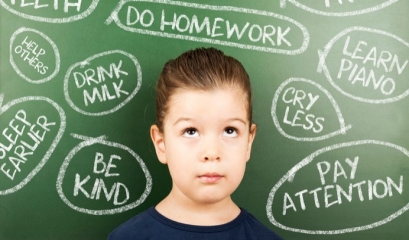It’s a new year which means its New Year’s Resolution season again. You’re likely used to seeing packed gyms as many set their sights on weight loss goals. There are several popular self-improvement goals people focus on. There’s absolutely nothing wrong with a plan to improve your life and family’s future. However, all too often, New Year’s Resolutions can end up making you feel worse by making you feel like a failure when you fall short of your goals. Those feeling can be amplified for children and youth.
On the flip side, every parent shares a sense of frustration when their child doesn’t try hard enough to accomplish a task you know they’re perfectly capable of completing. Often, the lack of inner drive results from parents establishing goals for their kids or pushing too hard. As an alternative parents and children can work together to establish goals and reach them. Helping to foster a can-do attitude will help your child learn to set goals and meet them. However, that’s just the start. Setting realistic goals is extremely important. Here are a few helpful tips to help your children and family set new goals in the new year.

Choose realistic goals
Sometimes kids choose goals that are so big or out of their element that it’s nearly impossible to meet them. For example, your child plays basketball and wants to be in the NBA. Help him set a more attainable and age-appropriate version of the goal for this year, for example score three baskets in a game. Encourage your child to choose goals that are realistic. Whatever goal your child sets, be sure that they came up with the goal. If you want your child to follow through, the goal has to have meaning to them.
Just out of reach goals are okay
Children and youth can get used to staying within their comfort zone to ensure success. The great thing about setting goals is that we learn to reach, we strive for something new. We might not meet a goal in the time we gave ourselves, but we might get very close. There’s value in trying, we have to teach kids to try.
Set a specific goal
Encourage your children to brainstorm specific goals that can be measured. A good goal is a specific goal.
Break it down
Often, goals and resolutions can be difficult to keep or achieve because they feel so large and daunting, it’s hard to know where to start. Encourage your children to break down their goals into smaller, manageable steps.
Checkpoints are important
Encourage youth to use a poster board to map out their goals. At the top of the poster, they write the main goal for the year. Underneath, they write the steps they can take along the way to reach the goal. With a visual aid in place, they can check in on their goals monthly or weekly and check off steps as they accomplish them. It’s important to encourage your child to establish his own checkpoint system. For kids to learn to set and meet their own goals, they need to develop systems that actually work for them.
It’s a family affair!
When families make goal setting a family effort, they learn to support each other. This can help foster an environment of cooperation rather than competition.
Applaud their effort
As your child begins to set goals and works toward them, don’t forget to complement their effort! For example, you can say something like, “when you care about something you really go for it” or “I’m very impressed, great job!”
Lastly, avoid using threats or bribes. Offering money or a video game in exchange for a good grade or giving a punishment for a low grade won’t help your child follow through with other goals in the long run.
With these helpful tips your children and family can be well on their way to setting realistic goals in the new year!